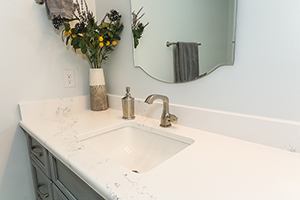
Simple fix-its like leaky faucet repairs may be made by the homeowner
Did you hear that? You may have asked yourself or your spouse that question on more than one occasion. Sometimes a home’s noises are easily explained – a faucet didn’t get turned all the way off and it’s dripping, or the ice maker is busy freezing and dropping new cubes. Others – like strange knocks or apparent footsteps – may have you wondering if your home is haunted.
There are usually non-paranormal, practical explanations for the most common household sounds, as well as solutions – some you can fix yourself and others that may require a professional.
The cause of a house’s creaks and squeaks can be numerous, depending on where the sound originates. One of the most common creak culprits is flooring. As time goes on, you may notice a certain floorboard or stair always squeaks, and it’s usually in the middle of the night when you’re trying to quietly make your way to the bathroom or kitchen without waking anyone.
Most often, these creaks are a board moving next to another or a board moving against a fastener. This is especially more prevalent in older homes where floorboards have naturally expanded or contracted over time, creating space and/or friction. The noise also could indicate an issue with the subflooring underneath. This doesn’t necessarily mean it’s time to replace the flooring and subflooring unless the material is in poor shape, but you may want to contact a professional who can fix the issue.
Noises coming from beneath your home, including loud pops or groaning sounds, shouldn’t be dismissed, especially if they persist. These could indicate an issue with the foundation, something no homeowner wants to hear but a potentially critical problem that should be investigated and addressed immediately, if necessary. (Additional indicators of foundation troubles can include doors and windows that stick or develop large gaps.)
Multiple things, not just faulty construction, can cause damage to the home’s foundation. Soil composition and moisture levels are key factors in many foundation problems. Different types of soil under the same foundation can cause uneven settling, leading to cracks (and the associated noises they bring). Water accumulation (in the soil, not just standing or running water), tree roots and temperature changes, as well as vibrations from heavy, sustained traffic if you live near a busy roadway, can all be factors in the health of your home’s foundation. If you suspect problems in this area, contact a professional ASAP.
If you hear scratching sounds coming from your walls or scurrying coming from the attic, chances are you have a pest problem. Rats and mice are notorious culprits, as are bats or squirrels in the attic. The impacts of these uninvited guests in your home go beyond the potential diseases they carry or the skin-crawling fear they provoke in some. Rodents, especially squirrels and mice, are notorious chewers as they attempt to tunnel from one area of your walls to another. And if they turn their tiny teeth toward your wiring, the damage to your home’s electrical system can be far-reaching, not to mention a fire hazard.
If you think your problem is rats or mice, trying some simple traps from the hardware store may be sufficient to solve an isolated issue. Squirrels or bats, as well as continued evidence of mice or rats, are likely jobs for pest professionals. When the removal is complete, be sure to ask them to investigate areas around your home where these animal invaders could be entering. After all, when you don’t address the underlying problem, the hassle and expense cycle caused by these home invaders is likely to repeat itself.
Last but not least, a common cause of household noises can be your home’s plumbing. And when it comes to plumbing, problems range from the minor pesky running toilet or dripping sink to loose/unsecured pipes. If you’re relatively handy, you may want to attempt fixing that toilet or faucet yourself. Parts are easy to find in home improvement stores and relatively inexpensive. The internet, particularly YouTube, can be a great resource for DIY videos that walk you through the steps. But you’ll want to leave any projects that are more complicated to a professional.
And if further investigation reveals extensive plumbing issues in a bathroom, for example, it might be the perfect opportunity to tackle that upgrade or remodel you’ve been dreaming about. Be sure to reach out to a design/build professional to see what the possibilities could be if you already know you’ll need contractors and plumbers in your walls repairing problems.
Photo: Courtesy Tracy Tesmer Design/Remodeling





